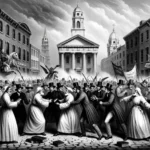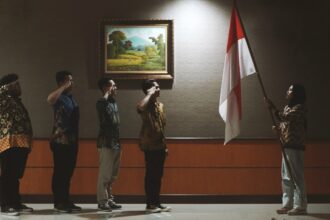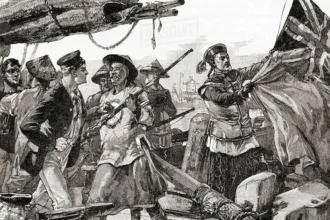The Essence of Intellectual Freedom
Books, those timeless bastions of knowledge and thought, have always been integral to the pursuit of intellectual freedom. Serving as both mirrors and windows to the world, they provide a platform for diverse ideas and perspectives, challenging the status quo and fostering a culture of inquiry and innovation. This essential role of literature becomes even more pronounced when faced with the oppressive tactics of authoritarian regimes.
Throughout history, these regimes have often perceived books as formidable adversaries, primarily due to their ability to spread revolutionary ideas and encourage independent thinking. Such a perception has led to various forms of censorship, ranging from subtle suppression to overt book burning. These acts of censorship, in essence, are battles against intellectual freedom, targeting the very foundations of a free and informed society.
This article delves into this continuous struggle, exploring how books have not only withstood the test of time but also played a pivotal role in upholding and promoting intellectual freedom. Through this exploration, we aim to underscore the enduring power of literature as a tool for social change and a guardian of our collective wisdom and liberty.
The Historical Battle: Books as Beacons of Liberty
The annals of history vividly illustrate the crucial role books have played in championing intellectual freedom. Time and again, oppressive regimes have resorted to book censorship as a means to stifle dissent and control public discourse. This battle against books is not merely an assault on paper and ink but a deeper, more insidious attempt to quash the very essence of free thought and expression.
In a society that values democracy and open discourse, access to varied literature is not a privilege but a right.
One of the most chilling examples of this phenomenon is the book burnings orchestrated by the Nazi regime. These acts went beyond the mere destruction of physical objects; they represented a systematic effort to eradicate ideas and knowledge that challenged the regime’s ideologies. Books, being repositories of diverse thoughts and viewpoints, were seen as direct threats to the totalitarian control over society. The burning of these books was not just an act of censorship but a symbolic declaration of war against intellectual freedom.
This historical confrontation underscores the power books hold as beacons of liberty. They are not just collections of words, but symbols of resistance and hope. In their pages lie the power to challenge tyranny, to inspire change, and to preserve the fundamental human rights of free speech and thought. The struggle to protect them from censorship is as much about preserving our cultural and intellectual heritage as it is about safeguarding our future. As we reflect on these historical battles, we are reminded of the enduring importance of books in the ongoing fight for intellectual freedom and the crucial role they play in maintaining a free and enlightened society.
Modern Censorship: A Continuing Concern
In today’s world, the challenge to intellectual freedom persists, even within societies renowned for their democratic principles. Instances of book banning in countries like the United States are a troubling testament to this ongoing struggle. These acts, often initiated or supported by political figures, serve as stark reminders of the fragility of the freedoms we sometimes take for granted. Far from being confined to authoritarian regimes, the impulse to censor and control the flow of ideas finds its way even into the heart of democracies.
This trend raises profound concerns. When books are removed from libraries or reading lists, it’s not just individual titles that are being suppressed; it’s the diverse ideas and perspectives they represent. Such actions, often under the guise of protecting public morals or maintaining social order, in reality, threaten the very foundations of intellectual freedom. They create a climate where ideas are no longer judged on their merits but are subject to the whims of those in power.
The irony is that these democratic societies, which pride themselves on free speech and thought, are witnessing a rise in the very practices they traditionally oppose. It calls into question the robustness of our commitment to intellectual freedom. Are we, as societies, willing to uphold the right to explore and discuss a wide range of ideas, even those we find uncomfortable or challenging?
The battle for intellectual freedom in modern times goes beyond books. It’s about the right to access, share, and discuss a wide array of viewpoints. It’s a struggle that requires vigilance and advocacy, ensuring that the freedoms we cherish are not eroded under the guise of protection or political expediency. As we confront these contemporary challenges, the role of books as vessels of diverse ideas and platforms for open discourse remains as vital as ever.
Resistance and Advocacy: Upholding the Right to Read
Amidst the troubling landscape of modern censorship, a resilient movement for intellectual freedom continues to thrive. Advocates dedicated to preserving the right to read have been instrumental in countering efforts to suppress literature. These individuals and organizations, ranging from librarians to legal activists, are the unsung heroes in the fight against book banning. Their commitment underscores the necessity of steadfast vigilance in safeguarding the public’s access to a wide spectrum of ideas and viewpoints.
Rather than quelling the spread of ideas, censorship often sparks a heightened interest in the banned works.
Significant victories have been won in this arena, often through legal challenges and public advocacy. These successes highlight the enduring importance and effectiveness of resistance in the face of censorship. They serve as powerful reminders that the right to access diverse literature is not just a matter of personal preference but a cornerstone of a free and informed society. These advocates operate under the belief that exposure to a breadth of ideas is essential for the development of critical thinking and the fostering of an open-minded and tolerant citizenry.
The efforts of these defenders of intellectual freedom go beyond merely protecting specific books; they strive to uphold a principle. This principle is that in a society that values democracy and open discourse, access to varied literature is not a privilege but a right. The work of these advocates involves not only resisting acts of censorship but also proactively promoting the availability and accessibility of diverse literature. They champion the idea that a robust democracy relies on an informed and educated populace, equipped with the tools to explore, question, and engage with a range of ideas and narratives.
The Irony of Censorship: Resilience of the Human Spirit
The irony inherent in the practice of book banning and burning is stark and revealing. Historically, these acts of censorship have frequently produced an outcome diametrically opposed to their intended effect. Rather than quelling the spread of ideas, censorship often sparks a heightened interest in the banned works. This phenomenon underscores a fundamental aspect of human nature: an innate curiosity and an unwavering commitment to seek out knowledge, even, or perhaps especially, in the face of attempts to suppress it.
Books do more than just tell stories or share information; they challenge our perspectives, provoke critical thought, and foster societal progression.
Throughout various epochs, attempts to suppress ideas have invariably led to a paradoxical increase in the interest and circulation of the censored works. This pattern points to the resilience of the human spirit and its relentless pursuit of intellectual freedom. The act of banning a book often serves to elevate its status, turning it into a symbol of resistance against oppression. This unintended consequence reveals the futility of censorship efforts, as the human thirst for knowledge and understanding proves to be indomitable.
Moreover, these censorship attempts highlight the intrinsic value people place on intellectual freedom. In many cases, the response to book banning has not only been an increased desire to access the forbidden works but also a broader mobilization in defense of the freedom to read and explore diverse ideas. This collective response is a testament to the strength of the human spirit and its inherent inclination towards freedom of thought and expression.
The resilience displayed in these scenarios is not just a reaction to censorship; it is a celebration of the power of ideas and the enduring human capacity to seek truth and understanding, regardless of obstacles. The irony of censorship, therefore, lies not only in its ineffectiveness but also in its ability to galvanize the very spirit of inquiry and freedom it seeks to suppress. This enduring resilience serves as a beacon of hope, affirming the unyielding human desire to explore, question, and understand the world.
Safeguarding Our Intellectual Legacy
In the realm of intellectual freedom, books stand as pivotal elements in the tapestry of a liberated and enlightened society. The ongoing struggle against censorship transcends the realm of individual literary works; it is fundamentally about preserving our collective intellectual heritage. This enduring battle is not merely a fight to save pages and words from oblivion but a deeper commitment to safeguard the very essence of our cultural and intellectual identity.
The steadfast dedication to intellectual freedom is a powerful testament to the transformative influence of literature. Books do more than just tell stories or share information; they challenge our perspectives, provoke critical thought, and foster societal progression. They are the vessels through which ideas flow from one generation to the next, fueling the continuous evolution of human thought and society.
Ultimately, our commitment to protecting and promoting intellectual freedom serves as a cornerstone in the ongoing endeavor to cultivate a society that values knowledge, cherishes diversity of thought, and embraces the transformative power of ideas. As we forge ahead, our collective responsibility is clear: to ensure that the legacy of literature and the freedom it embodies continue to flourish, unfettered by the chains of censorship. In doing so, we uphold not just the words of the past but also the promise of a more informed, open, and dynamic future.
Adapted from an academic article for a wider audience, under license CC BY 4.0









